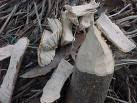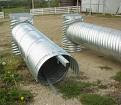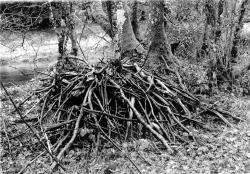
Since speaking to you on the telephone, I have received your leaflet. To be taken seriously, a consultation must be conducted by an independent individual or organisation, who ensures both sides have the same resources and opportunities. One carried out by the initiation of a project lacks credibility.
Your leaflet is more pro-beaver propaganda, mostly unsubstantiated facts which destroy your case. There is no mention of Dr Kitchener’s research on their former UK distribution, based on carbon-dated remains. He showed they were once plentiful in the South of England, becoming scarcer as one moved northwards. A few occupied the upper Tweed 7000 years ago. Just one in the west about 1500BC near the Ayrshire coast. None what so ever in Argyll. To use words like “return” and “reintroduction” in the context of this country is misleading. “Dump” or “inflict” would be more accurate language.
There were, of course, beavers in the S.E. of England 60 years ago ….. the South American (coypu), which are not dam builders. Yet the damage they did was still so great, they had to be exterminated. Which is why that is no plan to release beavers in the old heartland of East Anglia and the Thames Valley. Instead they are to be foisted on Scotland.
Today, throughout Northern Europe and the Americas on land vulnerable to beavers, damage worth millions of dollars and Euros is caused every year by these pests. As importers of these creatures you will be morally and legally liable got centuries to come. The claims will be few to begin with, but will multiply thereafter in size and number. The recent escape from a supposedly secure sire in Central Scotland showed how many cherished young trees could be savaged almost overnight. In time, there could be a human death ….. possibly from giardia (“beaver fever”) related illness, or a driving accident. Or the spawning beds of a major salmon river spoiled. Then the amount would be huge.
I can think of no species introduction, planned or unplanned, which has not proved costly. Rabbits, grey squirrels, sika deer, Canada geese, ponticum, Japanese knotweed. Recently hedgehogs in the Hebrides. Mink too.
The UK & Eire are presently beaver-free. Most countries of Europe are not. We should learn from their experience. There is no need to slavishly follow their example. We should be proud that we have the good sense not to harbour these pests, and therefore do not have to suffer the consequences of their depredations.
Your leaflet is more pro-beaver propaganda, mostly unsubstantiated facts which destroy your case. There is no mention of Dr Kitchener’s research on their former UK distribution, based on carbon-dated remains. He showed they were once plentiful in the South of England, becoming scarcer as one moved northwards. A few occupied the upper Tweed 7000 years ago. Just one in the west about 1500BC near the Ayrshire coast. None what so ever in Argyll. To use words like “return” and “reintroduction” in the context of this country is misleading. “Dump” or “inflict” would be more accurate language.
There were, of course, beavers in the S.E. of England 60 years ago ….. the South American (coypu), which are not dam builders. Yet the damage they did was still so great, they had to be exterminated. Which is why that is no plan to release beavers in the old heartland of East Anglia and the Thames Valley. Instead they are to be foisted on Scotland.
Today, throughout Northern Europe and the Americas on land vulnerable to beavers, damage worth millions of dollars and Euros is caused every year by these pests. As importers of these creatures you will be morally and legally liable got centuries to come. The claims will be few to begin with, but will multiply thereafter in size and number. The recent escape from a supposedly secure sire in Central Scotland showed how many cherished young trees could be savaged almost overnight. In time, there could be a human death ….. possibly from giardia (“beaver fever”) related illness, or a driving accident. Or the spawning beds of a major salmon river spoiled. Then the amount would be huge.
I can think of no species introduction, planned or unplanned, which has not proved costly. Rabbits, grey squirrels, sika deer, Canada geese, ponticum, Japanese knotweed. Recently hedgehogs in the Hebrides. Mink too.
The UK & Eire are presently beaver-free. Most countries of Europe are not. We should learn from their experience. There is no need to slavishly follow their example. We should be proud that we have the good sense not to harbour these pests, and therefore do not have to suffer the consequences of their depredations.









No comments:
Post a Comment